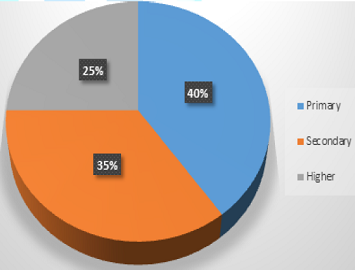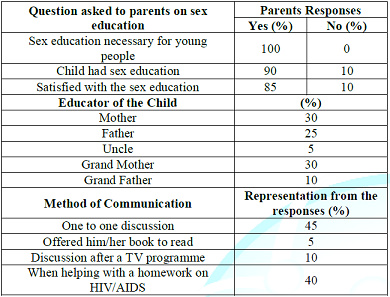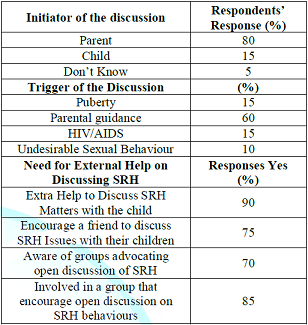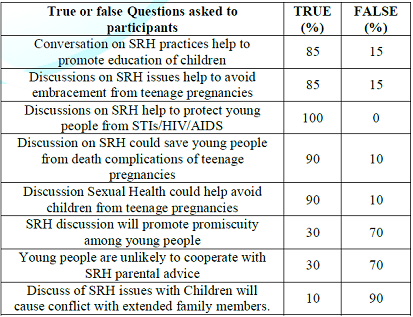Research Article :
Background: One of the neglected issues in our society today,
is effective communication between parents and adolescents on matters of Sex
and Reproductive Health. This problem has saliently exposed the adolescents to
the risk of contracting Sexually Transmitted Infections (STIs) and teenage
pregnancies as well as engaging in drug and substance abuse. As such, this
study aimed at assessing the extent of parent-adolescents communication on
Sexual and Reproductive Health (SRH) matters among the Lecturers at Evelyn Hone
College and their children. Methods: A cross-sectional descriptive survey study design
was used in which 85 respondents were conveniently recruited into the study.
Data collection was through pre-tested semi structured questionnaires. Analysis
of data was done using SPSS version18 and graphs were generated using Microsoft
Excel. Results: The study revealed that parents were not very much
willing to offer SRH education to their adolescent children. They preferred
having their children being taught SRH education by non-family members rather
than themselves. Additionally, it was further shown that parents were
initiators of SRH discussions in a home and not children. Further, it was also
revealed that adolescents who had ever received SRH education from their
parents were less likely to be promiscuous as compared to those who lacked such
education. It was however noted that most female lecturers spent much of their
time educating their children in SRH than their male counterparts. The findings
suggested that parenthood and gender play key roles in the communication of SRH
matters between parents and adolescent children. As it was seen that female
Lecturers spent much time communicating with their adolescent children on SRH
issues than the male Lecturers. However, there is need to create avenues other
than a home where adolescents will be able to openly discuss and share
experiences about SRH especially with the guidance of a parent. While parent-adolescent Sexual
and Reproductive Health (SRH) communication is one potential source of SRH
information for adolescents [1],it appears to be inadequately
practiced in Zambia. This inadequacy in preparing young people for safe sexual
life and good reproductive health, is part of the blame for the lack of skills
on sexual decision making among adolescents. Adolescence is one of lifes
fascinating and perhaps most complex stages, a time when young people take on
new responsibilities and experiment with independence [2].They search for identity, learn to
apply values acquired in early childhood and develop skills that will help them
become caring and responsible adults [3].For the adolescents to
make better decisions later in life they need to receive adequate information
mainly from the parents. Failure of effective Parents-adolescents communication
on Sexual and Reproductive Health can be closely linked to many social and
economic challenges such teenage unplanned pregnancies, an increase in maternal
mortality and infant mortality rates, increase in school drop-out rate and
increase the HIV/AIDS prevalence rates [2,4]. In Zambia, by the year
2014, 42% and 47% of women and men aged between 15 to 24 years had
comprehensive knowledge of HIV/ AIDS. Despite, this fact, less than 20% of
young women and men of ages ranging from 15-24 years had their first sexual
intercourse before the age of 15. More than half of women and half of men from
18-24 years have had sex before 18years old.This
increase in early
sexual engagement can be contributed to lack of parent-adolescents
communication on Sexual and Reproductive Health matters. Additionally, this
increase can be considered to have contributed to high levels of teenage and
unwanted pregnancies. These state of events can be prevented if communication
on matters concerning Sex and Reproductive Health are prioritized between
parents and their children [5]. Melgosa (2007) in his
book “Developing
a Healthy Mind”, explained that adolescence is one of lifes fascinating and
perhaps most complex stage, a time when young people take on new
responsibilities and experiment with independence [5].They search for identity, learn to apply values
acquired in early childhood and develop skills that will help them become
caring and responsible adults. However, these skills can only be developed if a
healthy environment is created when the adolescents and their parents can
discuss these issues freely [6,7].The
only way by which these skills can be developed through effective and
consistent communication between parents and their adolescent children. The issue of Sexual and Reproductive Health (SRH)
education and communication has been single out to be one of the health package
components that has been neglected for so long. This came to light in 2006
during the Southern
Africa Development Community (SADC) Summit on Sexual and Reproductive
Health in 2010 when member states Health Ministers met in Maputo, Mozambique.
During this event they came up with the SADC SRH business plan whose aim was to
Accelerate the attainment of healthy sexual and reproductive life for all SADC
Citizens [8]. In line with the above
mentioned negative effects of poor parent-adolescent communication on SRH, this
study aimed at assessing the extent to which Evelyn Hone College Lecturers in
Lusaka, Zambia communicate with their adolescent children about SRH matters. Methods A Cross-sectional descriptive design was used in the
study. The study was conducted at Evelyn Hone College in Lusaka District of
Zambia. The study population was composed of full time
Lecturers who had children with ages ranging from 12 to 24 years old. 85
Lecturers were conveniently sampled from a pool of 129 Lecturers. Only
lecturers who had, and were staying with their biological adolescent children
with ages ranging from 12 to 24 years were include in the study. Lecturers who
were excluded from the study were those with children below 12 years and above
24 years as well as those who were not staying with their adolescent children. Data collection tools that were used were anonymous,
structured and self-administered questionnaires. As soon as a questionnaire was
collected, accuracy checks were done and then the responses for each question
were entered in an excel spread sheet. Data from the Excel spread sheet were
then transferred to SPSS Version 18 which was used for data analysis. To ensure
reliability of the responses, some questions in the questionnaire were followed
with questions whose answers depended on the responses of the previous
questions. Clearance to interview the lecturers was obtained from
The Evelyn Hone College Management Board which gave a permission to interview
its lecturers. Total confidentiality was affirmed to all the participants and
they were informed that the study would not expose them to harm or injury and
that their participation was voluntarily with a leeway to stop filling in the
questionnaire at any time. Results Eighty-five questionnaires were administered and all
of them were filled in by the respondents representing a 100% response rate. Socio-demographic
Profiles of the Respondents The majority (60%) of the respondents were
males. The oldest respondent was born in 1950 while the youngest in 1963. The
modal year of birth was 1977. All the respondents had the same occupation as
Lecturers and all had biological adolescent children at their homes (Table1). Table 1: Socio-demographic Background of the Respondents. The majority (75%) of the respondents
adolescent children had attained a primary education with the least (25%) still
pursing college and university education (Figure
1). Figure 1: Highest level of education of youngest adolescents. Communication between Parents and Children on SRH
Matters All (100%) the respondents in the study were of the
opinion that SRH education is very important. Despite giving this opinion, some
(10%) of the adolescents did not receive SRH education from their parents.
Additionally, about 10% of the parents who offered SRH education to their
adolescents were not satisfied with quality of SRH education which they were
offering. The study further revealed that the more than half (60%) of the
adolescents received SRH education from their female parents and relatives. The
medium that was highly used in offering this education was one-to-one
discussion (45%) and the least (5%) used medium was offering the adolescent a
book to read (Table 2). Table 2: Parent-Child sex education. Drivers of SRH
Discussions between Parents and Children The study revealed that the main (80%) initiators of
SRH discussions were parents. In rare cases adolescents were initiators of the
discussions too. The majority (60%) of the respondents revealed that they
talked to their adolescents about SRH with the main purpose of offering them
routine parental guidance. Only about 10% of the respondents pointed out that
what triggered them to offer SRH education to their children was because of
some sort of undesirable behaviour which they started noticing developing in
their adolescent children. Topics such as puberty and HIV/AIDS equally
contributed to the triggering of the discussions (Table 3). Parents Need for External Help to Educate their
Adolescent About SRH Most (90) of the respondents indicated that they
needed someone who was not a member of their families to educate their
adolescents. Among reasons which they cited for favouring this, were that an
external educator created a favourable environment for offering SRH education
because each one is free to discussing on any topic such as sexual intercourse.
More than three quarters (75%) of the respondents were indicated that they
could prefer referring their children for training of SRH to their close and
trusted friends. Additionally, about 85% of them signalled that they would be
more comfortable with their adolescents joining groups or clubs that encourages
open discussion on SRH behaviours. Opinions on SRH Education and Communication between
parents and adolescents When respondents were
asked about their opinion SRH education and communication with their
adolescents, all (100%) the respondents were of the opinion that discussion on
SRH issues protected young people from contracting
and spreading STIs and HIV/AIDS. However, among them, about three quarters
(70%) disputed that SRH discussions between parents and adolescents were likely
to promote promiscuity among them. Additionally, they were of further opinions
that it was false to justify that young people were unlikely to cooperate with
parental advice on SRH (Table 4). Table 3: SRH Discussion between Parents and Children. Table 4: Lecturers Opinion on SRH education between parents and adolescents. Discussion The study assessed the level of Parents-Adolescents
Communication on Sexual and Reproductive Health Matters between Evelyn Hone
College Lecturers and their Adolescent Children, Lusaka, Zambia. Sociodemographic
Characteristics of Respondents In this study, all the respondents were lecturers.
This implies that all the respondents were educated up to the tertiary level of
education. Additionally, they were all in full time employment. As a result of
this, the study did not consider the influence of employment and education
levels on parents-adolescents communication on Sexual and Reproductive Health
matters. Unlike the findings of the study by Yadeta and his
colleague, on factors affecting parent-adolescent discussion on reproductive
health issues in Harar, Eastern Ethiopia, where it was revealed that parents
who were in full time employment were less likely to educate their adolescents
on SRH matter than those who were not in employment [8,9].In this study, the findings were otherwise.
This study revealed that employment status of parents had less impact on SRH
education between parents and their adolescents. What affected the level of
communication between parents and adolescents was the gender of the parent
regardless of the gender of the adolescent as it was observed that the majority
(60%) of the female parents found time to have discussions with their
adolescents. Additionally, it was further noted that parents who
belonged to Pentecostal (35%) denominations were too open to discuss with their
adolescents on SRH matters as compared to those who belong to Catholic (25%) [10].These findings were in agreement with the
findings of the study that was done on SRH communication between mothers and
their adolescent daughters in Northern Nigeria, where it was as well noted that
above 85% of Pentecostal parents were willing to discuss SRH issues with their
adolescent daughters. This can in no doubt make one conclude that religion has
influence on openness during discussions between parents and adolescents. Additionally, this study further showed that parents
reduce the level of communication on SRH issues when children progress in their
academic ladder. This is true as it was seen that 40% of the respondents
discussed SRH issues with adolescents in primary school, 35% with adolescents
in Secondary school and only 25% of the respondents with their adolescents in
tertiary institutions of learning. These findings were centrally to those of
the study done by Motsomi and his colleagues where it was revealed that in
Zandspruit informal settlement in Johannesburg, South Africa, Parents were more
willing to discuss SRH issues with adolescents in Tertiary learning
institutions [11].There
are many reasons linked to this disparity. One of the reasons is that in Zambia
culture plays a role in that parents take it that children in Tertiary
institutions will learn more on SRH from their teachers and friends. As such
they mostly pay attention in educating primary school going adolescents while
their counterparts in South African take it that when children grow up, SRH
education has more meaning to them as they are at the level of making
independent decisions. Communication between
Parents and Children on SRH Matters All the parents in this study were in agreement of the
fact that it is important to educate adolescents about SRH. However, SRH
education was mostly offered by female parents (60%) than male parents (40%).
Soon and others in their study stated that the reason for such a disparity of
having more female parents playing a role as Sexual and Relationship Educators
than their male counterparts was attributed to the fact that in most of the
African Societies most males are engaged in looking for food for their families
while women remain home with their children [12].This
gives women an advantage of providing sexual education to children by virtue of
spending more time with them at home. This study further revealed that even when women were
in full time employment, they remained more dedicated to educate their children
in SRH issues. This means that children who spend more time with their male
relatives are more likely to remain less educated in SRH education. Even,
Wamoyi and her colleagues made similar conclusions on this issue in their study
in titled Parent-Child
Sexual and Reproductive Health Communication in Rural Tanzania where they
discovered that male adolescents knew less about SRH [13]. During discussions, topics which most (70%) parents
discussed with their children were HIV/AIDS, STIs, Voluntary Counselling and
Testing, and abstinence. On the contrally, most parents never discussed topics
on condom use and family planning. This lack of balancing the topics of
discussion by the parents to their children was not a good signal. For
instance, lack of lessons on family planning could increase the risk of
contracting HIV/AIDS, STIs and unwanted pregnancies. So is the lack of lessons
on condom use too [7]. The method which majority of the lecturers surveyed,
used to communicate SRH issues with their children was through a one-to-one
discussion and through helping their children with Home Work and Assignments on
HIV/AIDS topics. Very few gave their children books which talk about SRH
education. This means that teachers and lecturers contribute to the provision
of SRH to the adolescents and the role they play in this exercise should be
appreciated [8].However, the reading
culture is also bad in that only 5% of the parents gave their children to read
about SRH Drivers of SRH
Discussions between Parents and Children This study revealed
that discussions involving SRH were mostly initiated by parents than the
adolescents. This was because 80% of the respondents were responsible for
initiating such discussions. Among these (80%) respondents, 60% of them
indicated that they did that because it was a form of parental
guidance as it was a way of instilling good manners and discipline in their
children. This notion is however disputed by the findings of Hall, et, al (2012) who stated that most
parents only realise the importance of SRH discussions when they notice
undesirable Sexual Behaviour being portrayed by their children. However, in
this study, this factor was the least of the major initiators of SRH
discussions because only 15% of the parents affirmed to this as the cause for
the initiation of the discussions [14]. Parents Need for External Help to Educate their
Adolescent About SRH Most of the
participants indicated the need of having other people helping them to discuss
SRH matters with their children. This could have been due to cultural
traditions which makes them hide some of the details of the sexual
education lessons. The reason for soliciting for external help could be
that communicators not related to the adolescents were usually more open to the
adolescents unlike the parents. This was somehow in line with what findings in
the study on Parent-child communication about sexual and reproductive health
conducted in the Brong Ahafo region in Ghana where it was revealed that parents
favoured hiring someone unrelated to their child to offer SRH lessons on
marriage, sexual tactics and other relationship details [15]. Lecturers Opinions on SRH Education and Communication
between parents and adolescents When the respondents
were inquired of their opinions on SRH communication, most of the respondents
were in disagreement that with the opinion that SRH discussions promoted
promiscuity among young people. Additionally, nearly all (90%) of the
respondents disagree to the opinion that young people were unlikely to
cooperate with SRH parental advice and that discussions of SRH issues with
adolescents were likely to caused conflicts with extended family members. However, Bushaija et
al (2013), discovered that many Foreigners in refugee camps especially with
Democratic Republic of Congos descent often had conflict with relatives who
discuss SRH issues with their children [16,17].They
have thought such discussions promoted promiscuity among adolescents because
they develop curiosity to attempt what they have been taught so that they prove
on their own [18].This strongly
contradicts with the findings of this study just as explained above. Conclusions The study revealed that parenthood and gender play key
roles in the communication of SRH matters between parents and adolescent
children. As it was seen that female Lecturers spent much time communicating
with their adolescent children on SRH issues than the male Lecturers. It was
further found that parents are not too comfortable to communicate SRH topics
with their biological adolescent children and as such preferred their
colleagues to talk to their children. Furthermore, it can concluded that all respondents
were of the opinion that SRH education reduces promiscuity among the
adolescents. However, there is need to create avenues other than a home
where adolescents will be able to openly discuss and share experiences about
SRH especially with the guidance of a parent. Acknowledgements The authors would like to acknowledge substantial help
offered to them by the Evelyn
Hone College Management during the collection of data. Many thanks to all
the members of staff at Evelyn Hone College who participated in the study and
the Head of Environmental Health Section, Mr John Lungu who was flexible in
allowing the author(s) to work on the manuscript with minimum interference. References Parents, Adolescents, Communication, Sexual and
Reproductive HealthAn Assessment of Parents-Adolescents Communication on Sexual and Reproductive Health Matters between Evelyn Hone College Lecturers and their Adolescent Children, Lusaka, Zambia
Titus Haakonde, Sampa Chisumbe, Mary Chibwe and Kennedy Iwol
Abstract
Full-Text
Introduction





Keywords